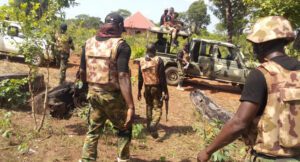Nigerian military’s reckless air strikes: The need for thorough investigation into Kaduna massacre
The recent massacre in Tudun Biri, Kaduna State, wherein innocent civilians fell victim to misdirected air strikes carried out by the Nigerian Army, stands as an utterly heart-rending tragedy of immense proportions.
With the death toll soaring to a staggering 87, it is particularly distressing to note that a significant number of the victims were innocent children, further intensifying the gravity of this appalling incident.
In light of this grievous occurrence, it is imperative that swift and decisive action be taken to ensure that those responsible for this heinous act are held accountable, leaving no room for this tragedy to go unpunished.
Moreover, this devastating event should serve as a resounding wake-up call, compelling a comprehensive and transformative overhaul of the rules of engagement employed by the security
Despite the ongoing conflicts in the Middle East, Ukraine, and Myanmar, this disaster has garnered global attention. It has exposed gaps and a lack of coordination in the anti-insurgency campaign, reminding Nigerians of the precariousness of their country, where the military’s full might is deployed across its entire breadth.
According to reports, the air strikes targeted a gathering of men, women, and children who were attending a religious ceremony in Tudun Biri.
The missiles were fired from drones deployed by the Army, which has recently increased its weapons platforms with aerial assets, including drones and an ongoing rebooting of its aviation wing.
Survivors have shared horrifying accounts of the incident. The community claims that the death toll is 127.
Ibrahim Yakubu, who lost his mother and two children, described the bodies of children being “torn to pieces” and pregnant women being killed. Aisha Haruna lost 13 relatives, while Idris Dahiru lost 30.
Although the Nigerian Air Force initially denied carrying out the air strikes, the Nigeria Army later admitted responsibility, stating that the crowd had been mistaken for bandits.This tragedy demands swift action.
A thorough investigation must be conducted, and those responsible must face consequences.
The rules of engagement need to be reevaluated to prevent such incidents from happening again. Additionally, a determined effort must be made to eradicate banditry and terrorism in the country.
The international community must also take note of this tragedy and lend their support to Nigeria in its fight against insecurity.
The lives lost in Tudun Biri should not be forgotten, and their deaths should serve as a catalyst for change and a renewed commitment to peace and security in the country.
Human Rights Watch has documented numerous instances since 2017, where misdirected air strikes have caused the deaths of hundreds of individuals, including refugees, aid workers, and even military personnel.
It is imperative that the Nigerian military and civilian authorities take immediate action to address these grave errors and ensure strict accountability for those responsible.
The list of civilian casualties caused by misguided air strikes is distressingly long.
In January 2017, NAF jets mistakenly bombed Rann town, resulting in the deaths of 126 individuals, including internally displaced persons and aid workers. Similarly, in April 2020, an airstrike in Sakatoku village killed 17 people, including women and children, while missing its intended target of Boko Haram terrorists.
These incidents highlight the urgent need for improved intelligence gathering and analysis to prevent such tragic errors.
Regrettably, the Nigerian military has shown a lack of accountability in addressing these grave mistakes. Despite repeated incidents, there has been a failure to hold commanders responsible for their lapses, leading to the deaths and injuries of innocent civilians and troops.
This negligence is further compounded by the civilian authorities’ failure to demand strict accountability and take necessary disciplinary and administrative action.
It is essential that both the military and civilian leadership prioritise the protection of innocent lives and take immediate steps to rectify this situation.
As a prominent political figure, Bola Tinubu has the opportunity to bring about meaningful change in addressing the issue of reckless air strikes. The recent probe into the Kaduna killings should not be a mere formality but should be followed up with appropriate sanctions.
Tinubu must demonstrate a commitment to accountability by demanding a thorough investigation into previous incidents and ensuring that those responsible are held accountable for their actions.
This will send a strong message that the Nigerian military’s disregard for civilian lives will no longer be tolerated.
The Nigerian military’s repeated instances of misdirected air strikes resulting in the deaths of innocent civilians and troops demand urgent attention.
It is imperative that the civilian authorities take a proactive stance in demanding accountability and implementing necessary disciplinary and administrative actions against those responsible for these lapses.
Bandits, who were previously concentrated in Zamfara, have now multiplied to around 30,000 in that state and 120,000 across the North-West region, according to researchers at Uthman Dan Fodio University, Sokoto.
They have also spread to the North-Central region, attacking military bases, ambushing troops, and exerting control over territory.
The Katsina State Government has acknowledged their presence in 24 out of its 34 Local Government Areas (LGAs), while in Kaduna, Niger, and Sokoto states, they have virtually taken over some LGAs, imposing their authority and levies on villages and communities.
Estimates suggest that over 100,000 people have been killed by terrorists and bandits since 2010. The Nigeria Security Tracker reported 63,111 deaths caused by various criminals in the eight years leading up to May 2023.
The issue of coordination has become a major concern in the current situation. While official spokesmen for the military branches deny it, frontline personnel consistently inform reporters and NGOs about the lack of effective synergy among the services.
As the Commander-in-Chief, Tinubu should initiate comprehensive reforms and prioritize coordination among the military branches and intelligence services.
Additionally, there is an urgent need to reform and reorganise the intelligence services, as today’s security threats are vastly different from those in 1989 when the last review was conducted.
In addition to investigating and punishing the perpetrators, the Minister of Defence, Abubakar Badaru, must take responsibility.
Moving forward, there should be stricter civilian oversight of the military. The arms-length approach that successive administrations have taken towards the military should be discontinued.




